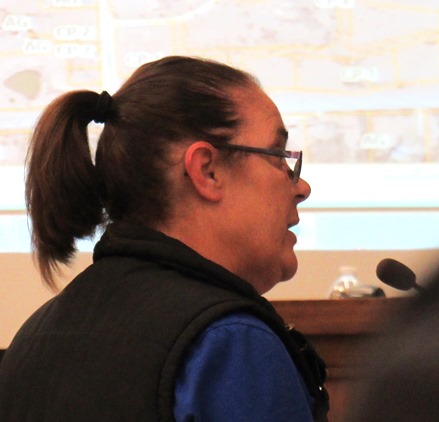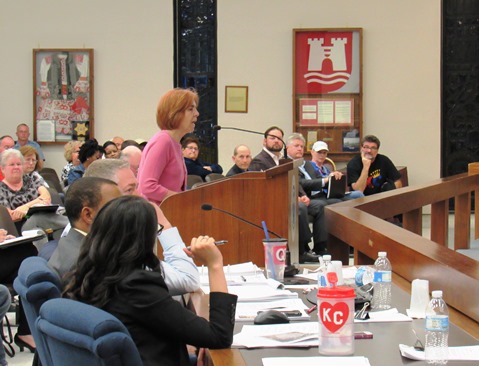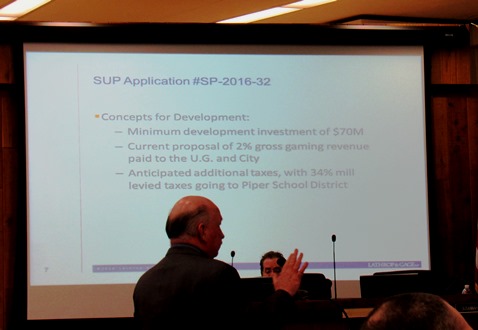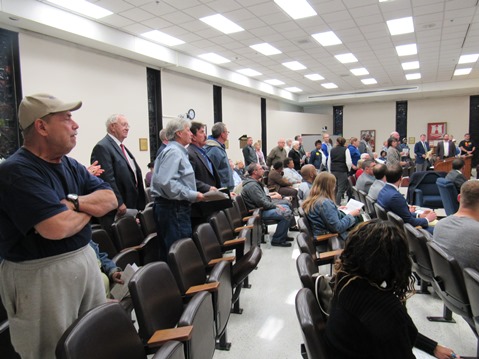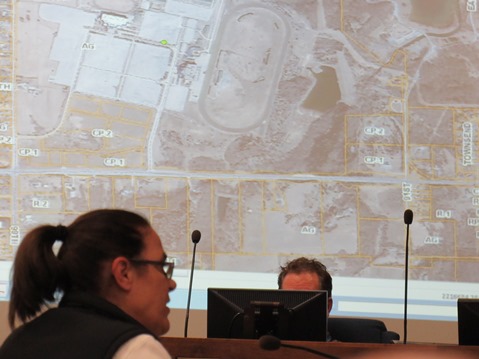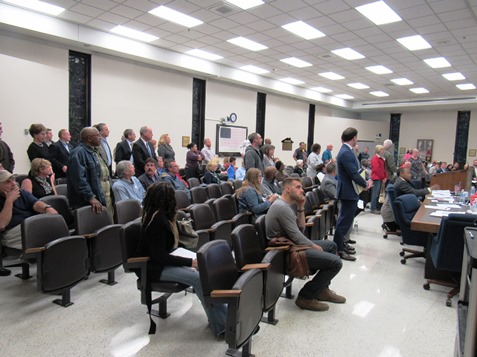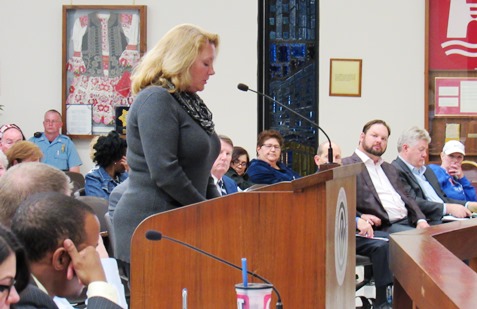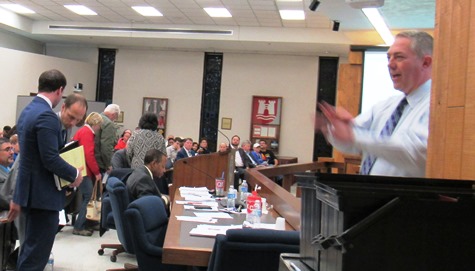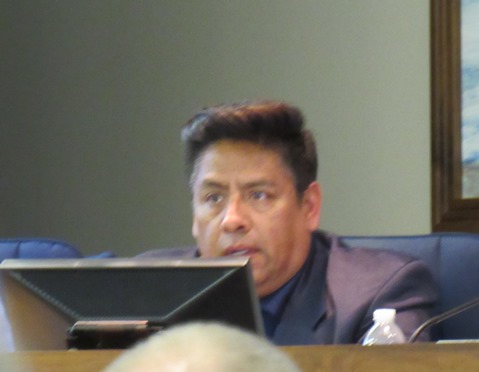by Mary Rupert
On a unanimous 9-0 vote, The Woodlands’ special use permit was approved at Thursday night’s Unified Government Commission meeting.
A representative for The Woodlands, attorney Scott Beeler, pledged that the pari-mutuel racetrack would contribute $100,000 to the UG’s charitable fund. The Woodlands, which has been closed since 2008, will apply for a maximum of 750 slot machines, Beeler said. There were many stipulations included in the approval.
Phil Ruffin Jr., executive director of the Ruffin Companies, was at the well-attended meeting.
The special use permit had stipulations on it numbering in the teens carried over from the Planning Commission meeting, and an additional stipulation was added Thursday night. The boundaries of the area are changing slightly, smaller than originally submitted, because some of the original area is now owned by the UG. Also, it was decided that the final plan review on The Woodlands will have to come back to the UG Commission for final approval.
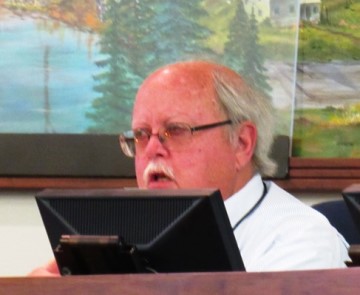
During a discussion on whether to do an economic study, Commissioner Hal Walker remarked, “You don’t need an expert every time to tell us to open a window when it’s hot.”
“Seventy to $92 million of investment potentially,” Commissioner Harold Johnson summed up. “No incentives, no subsidies, no abatements. Positive impact on our tax rolls of nearly $2 million, maybe more. That shows impact to me. That shows commitment and they’re talking about a pledge of another $100,000 for charitable contributions,” he said. “I think we need to move forward with this.”
After the meeting, opponents said they would talk over the situation, consider their options and then decide what to do next.
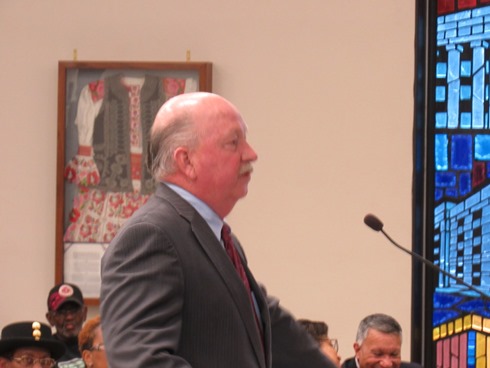
Details of the project
Beeler said the special use permit is the first step in its process. The Woodlands is also asking the state Legislature to approve a bill that lowers the rate of slots income to be paid to the state from 40 percent to 22 percent.
Not all details are worked out yet in the project. Beeler said there would be a minimum $70 million investment, which includes about $15 million in land purchase and about $55 million for redeveloping the racetrack. At this time, the building where visitors watched horse races is scheduled for either demolition and rebuilding or for rehabilitation, according to Beeler. The facility will be a minimum of 85,000 square feet, he said.
There was no confirmation of plans for the dog racing building.
Beeler said The Woodlands is making a commitment for a first-class development.
He said it is expected to have three restaurants, and he showed slides of a racino-type building. While there were not a lot of details being shown at this time, the applicant must come back for a plan review, according to UG officials.
“Our concepts are based upon bringing a whole new destination facility to Wyandotte County,” Beeler said. The racino is expected to draw from the metropolitan area and the region.
Currently, $187,000 is paid on property tax at The Woodlands, he said. If it is valued at $40 million, it would result in more than $1.8 million in property tax, he said, a difference of an additional $1.6 million that comes into the local government.
About 31 cents of each property tax dollar would go to the Piper school district, by law, he said.
The Woodlands would bring 600 to 700 jobs to the county, and about 200 construction jobs, Beeler said. When asked by Commissioner Gayle Townsend about the jobs, Beeler said there are about half the number of jobs there during the off-season.
Lack of economic impact study
Earlier in the meeting, Commissioner Jane Philbrook said she saw all that The Woodlands could do for Wyandotte County, but it was like “pie in the sky.” “I don’t know what it’s really going to turn out like, and we don’t know if it’s going to pass at the state level,” she said.
Both those for and against The Woodlands’ reopening referred to the fact that there wasn’t an economic impact study done this time.
Opponents suggested waiting to approve the permit until an economic impact study was done. Beeler said that opponents had time to do one and had not done an economic study.
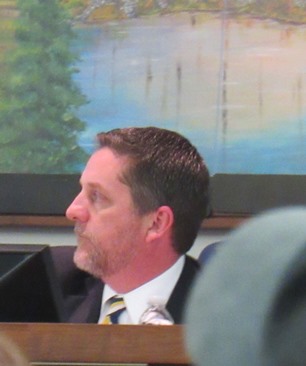
Mayor Mark Holland discussed the possibility of doing an independent economic impact study and was told it might cost around $30,000 to $50,000 and take at least 90 days. When the casino went in, the casino funded a study that was directed through the state.
“I don’t want to damage the revenues we have coming into the city now, nor do I want to have a facility open 24 hours that we’re not able to provide adequate service to,” Mayor Holland said. He said he would be in favor of doing an economic impact study.
He also said earlier that he would generally be in favor of the permit because a lot of people wanted The Woodlands to reopen, although he personally doesn’t gamble. Mayor Holland said it was possible that the UG could lose gaming revenue, in that it could take revenue away from an entity that is paying the UG at 3 percent and shift it to a group that is potentially paying the UG nothing outside of property taxes.
He discussed the possibility of the Legislature passing a new law that could completely eliminate gaming revenue paid to local governments. Casinos currently pay 3 percent of gaming revenues to the UG, while one of the proposed bills would require racinos to pay 2 percent of the slots income to the UG. Beeler said, in response to a question, that The Woodlands supported a bill that would pay 2 percent of the slots income to the local government.
The Legislature is now in its final days before adjournment, and Beeler said legislators who will vote on a bill for the racetracks might ask themselves why they would vote for it in Wyandotte County if Wyandotte County has not granted a special use permit. He said the Legislature was looking for the UG’s guidance.
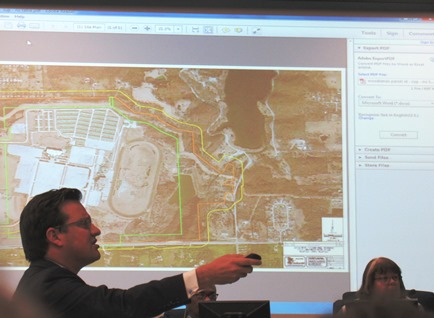
Boundary lines changed on application
Korb Maxwell, an attorney representing Kansas Entertainment, which is the manager of Hollywood Casino at Kansas Speedway, said the special use permit application had serious procedural defects. The original application to the Planning Commission had the wrong boundary lines and the legal description was not correct. Maxwell said he heard about this for the first time only just before the 7 p.m. meeting Thursday.
What happened, according to Beeler, was they used the old boundary lines that The Woodlands used in 1989. However, a small amount of acreage of the property changed hands when The Woodlands couldn’t pay its taxes and a small slice of the property went to UG ownership. Beeler said it was a minor issue, and that because the total area that needed the special use permit was shrinking, not growing, it did not affect the project. More people were notified than were necessary, he said.
“This was 100 percent gerrymandering,” Maxwell said. He said it went against local codes and state laws and takes away proper notice and protest rights for the people. “I have never seen anything like this,” Maxwell said.
“If I were to bring forward this type of application on any other private development in this community, Rob [Richardson, planning director] would throw me out of the office,” Maxwell said. “But here we’re doing backflips to try to let them to present.”
Maxwell asked why. “We don’t have a site plan, we don’t have a traffic plan, we have a 30-year-old facility that never had 24-hour operation in it,” he said. “Why do we have to push this?”
Maxwell said that the applicant said it himself. “This isn’t about this commission,” he said. It’s to get the process started in Topeka, he said.
Under current law, 3 percent of the slots proceeds would be paid to the UG, and under a proposed law, 2 percent of the slots income would go to the UG. Also, the amount of money that would have to be paid to the state from slots income would be lowered from 40 to 22 percent under the proposed legislation in Topeka.
“This is the single biggest tax abatement that’s ever been put in front of this commission,” he said.
Beeler did not agree. The change in the boundaries was minor and there wasn’t anyone else who should have been notified who wasn’t notified.
He said there were no reasons to delay the project, and all the Golden criteria for zoning were met. The project received staff approval, the Planning Commission supported it on an 8-2 vote, and there has been support from the public, he said. There was not a single reason why the special use permit should not be granted, he said. Also, he said that The Woodlands is not asking for any bonds or tax abatements.
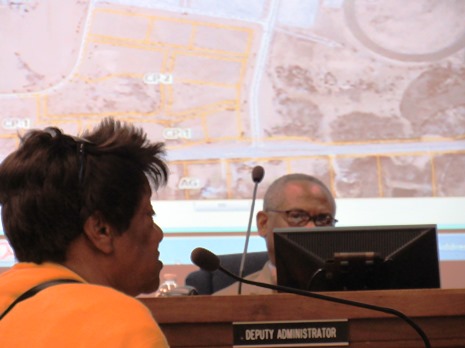
Attorney general’s opinion
Beeler also referred to a recent attorney general’s opinion. A Kansas attorney general opinion issued April 22 mostly discussed Wichita and how Sedgwick County could not take another citizen vote to have slots at a racetrack. That area already defeated it in a vote taken within the time allowed by the law.
Wyandotte County was touched on briefly in the attorney general’s opinion last week, and the opinion said Wyandotte County could be allowed to have slots at its racetrack as it took a successful vote at the time. Slots passed with 80 percent in 2007.
“On June 26, 2007, within 180 days required by statute, a majority of the electorate in Wyandotte County approved the placement of EGMs [electronic gaming machines or slots] at the pari-mutuel licensee location in the county,” the attorney general’s opinion stated.
As Sedgwick County defeated the slots question, Wyandotte County and Crawford County were the only ones left that could have slots at the pari-mutuel tracks, the opinion stated.
The attorney general said in the opinion that a bill that would allow Sedgwick County residents to vote now on allowing slot machines in Wichita would breach the contract of the Kansas Lottery with the Mulvane, Kan., casino.
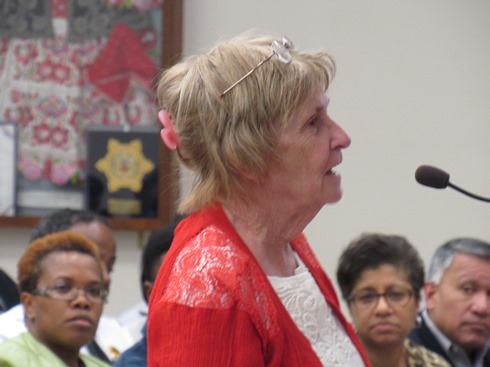
State ‘looking for UG’s guidance’?
During a break in the three-hour discussion, former Mayor Carol Marinovich, who decided not to speak publicly at the meeting, said that she found it significant that Beeler had said the Legislature is looking for the UG’s guidance.
Commissioner Melissa Bynum later told Beeler that she did not agree with that statement that the state wanted the UG’s guidance. The Legislature has changed when local governments hold elections, has placed a property tax lid on them and has taken away prevailing wage, and those actions went against the UG Commission’s positions.
“I just want to be clear with you that that is not our experience,” Commissioner Bynum said.
Beeler returned to the idea that The Woodlands had done everything it needed to do to comply with the zoning regulations.
“There has to be evidence and there isn’t any,” Beeler said about arguments against the special use permit. While there has been speculation from opponents that there might be negative effects, there is no evidence of it, he said.
During public comments, more persons appeared to be present in support of The Woodlands than against it. Three persons spoke against greyhound racing, and Beeler said The Woodlands is not planning to have dog racing. Any change in that would have to come before the commission for approval.
Commissioner Mike Kane, who represents the 5th District where The Woodlands is located, was not at the 7 p.m. meeting.
Many other comments were made during the meeting. To see a video of it, visit https://www.youtube.com/watch?v=nOiJOEB2TSg.
To read an earlier story on The Woodlands’ special use permit, visit https://wyandotteonline.com/planning-commission-approves-permit-for-woodlands-reopening/.

